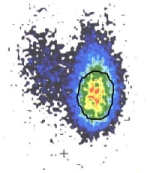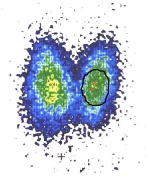Nuclear medical policlinic patient information
Registration by telephone: (089) 4400-74646
Irrespective of many efforts to improve the iodine supply in food, Germany is still a struma endemic area. Frequent consequences are strumas (“goiters”) with and without formation of nodes, which may in the end cause functional thyroid disturbances.To clarify the thyroid function, the thyroid hormones will first be defined, together with another hormone regulating the thyroid hormonal system (so-called TSH).In case of strumas palpation will be followed by neck sonography. This allows statements on the structure and morphology, but cannot give information on the thyroid function. If nodes are seen in sonography, a thyroid scintigraphy will generally be done, since this enables the differentiation of the functional activity of nodules. Nodules which produce an increased number of hormones (mostly so-called focal autonomas) may lead to hyperthyroidism; in the thyroid scintigraphy, they show an increased uptake (“hot nodes”) and are mostly benign. Nodules with reduced hormone production mostly consist of regressively changed thyroid tissue; in the scintigraphy, they show a reduced uptake (“cold nodes”). Since such nodes may rarely also be malignant (thyroid carcinoma), they should be further clarified by fine-needle aspiration, which is mostly painless.In addition to the focal autonomas, so-called disseminated autonomy or Morbus Basedow (Grave's disease) may also cause hyperthyroidism. Hypothyroidism, however, is mostly caused by thyroid inflammation.Prevention or early recognition and treatment of thyroid diseases is the important task of the cooperation between specialists for internal medicine and nuclear medicine, to prevent diseases and surgery. In this sense, the Department of Nuclear Medicine at the University of Munich does all diagnostic steps together with residents, but also with colleagues at the University’s policlinic and gives corresponding recommendations for therapy.If radio iodine therapy is needed, we offer therapy of benign and malign thyroid diseases and follow-up tests (together with the departments for internal medicine; in particular for patients with thyroid carcinoma).An example:
|
Patient with hyperthyroidism with a “hot nodule” in the left thyroid lobe (autonomic adenoma). The right thyroid lobe is functionally suppressed. |
|
|
Same patient, 6 months after radio iodine therapy. The thyroid function is now normal. The autonomic adenoma is functionally mostly eradicated; the right thyroid lobe shows normal functional activity again. |
|


